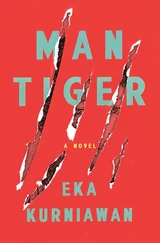Once the boat docked the Japanese soldiers started screaming again, and the women jumped down as quickly as they could. Children began to cry, and there was some commotion: a suitcase was flung into the river and its owner got drenched trying to catch it, a sleeping pallet fell into the mud, and a mother was separated from her child who was trampled in the chaos. The group walked toward the prison, passing through three iron gates guarded by soldiers. Before entering, they lined up in front of a table where two Japanese men sat clutching a list. Next to them there was a basket for money and valuables. A number of women were already taking off their jewelry and tossing it in.
“Do it before we search you,” ordered one of the soldiers in proper Malay.
You can go ahead and search my shit, Dewi Ayu thought to herself.
The prison was way more disgusting than a pigsty. The roof leaked, the walls were splattered with old blood, with moss and weeds growing through the cracks, and the floor was dirty, teeming with lice, cockroaches, and leeches. Sewer rats as big as a child’s thigh ran around in a frenzy, startled by the newcomers, zigzagging in between the women’s legs as they hopped up and down shrieking. The women scrambled to mark their own territory with their suitcases as quickly as possible, cleaning up and sobbing all the while. Dewi Ayu claimed a small spot in the middle of a hall, unfurled her mattress, and with her suitcase for a pillow, she lay down exhausted. She was lucky she didn’t have a mother or a child who needed tending and that she hadn’t forgotten the quinine tablets and other medicines, because there was the threat of malaria and dysentery: the toilet didn’t work.
That evening there was no food. The small scraps that each of the women had brought had been finished by lunchtime. Someone asked the Japanese men about food, and they replied maybe tomorrow or the next day. That night they would have to go hungry. Dewi Ayu went out of the hall toward the fields. The three prison gates were open and people could roam out of the fort to walk around. When she had arrived earlier, Dewi Ayu had spotted some cows. Maybe they belonged to the native wardens or the farmers who lived in the delta. She had gathered a bunch of leeches while cleaning her spot in the prison hall, stacking them inside a Blue Band margarine tin. She found one of the cows grazing, the fattest one, and plastered the leeches onto its hide. The cow only glanced up for a moment, undisturbed, and Dewi Ayu sat on a rock waiting. She knew the leeches were sucking the cow’s blood, and when they were full, they would fall off like ripe apples. She plucked them off the ground and put them back inside the tin. Now they looked swollen and fat.
Making a small campfire, she boiled all the leeches in the tin with some water from the river. Without adding any seasoning, she quickly brought them back to the hall that was now her new home. “Dinner is served,” she said to a number of women and children who were living near her, her new neighbors. No one was interested in eating leeches, and one woman practically retched at the very thought of such a meal. “We’re not eating the leeches, but cow’s blood,” Dewi Ayu explained. She split open the leeches with a small knife, pulled out the clots of cow’s blood inside them, stabbed them with the point of the knife, and swallowed them. Nobody moved to join in her savage meal, at least not until night fell and they could no longer bear their hunger. Then they tried it. It tasted bland, but sort of good.
“We won’t starve,” said Dewi Ayu. “In addition to leeches, there are geckos, lizards, and mice.”
“Okay,” the women said hurriedly, “great, thanks.”
That first night was truly gruesome. Daylight disappeared quickly, as it does in the tropics. Though there was no electricity, almost everyone had brought candles, and their small flames crowded the walls with trembling shadows that terrified the small children. Stretched out on sleeping pallets, looking quite pitiful, no one could get any sleep. Mice skittered over them in the dark, mosquitoes buzzed from one ear to another, and flying foxes crisscrossed overhead. Even worse were the surprise inspections from the Japanese soldiers, looking for people who were still hiding money or jewelry. Morning came but promised nothing.
Bloedenkamp was filled with about five thousand women and children, gathered from who knows where. The only ray of hope came from a fortune-teller, who consulted her deck of cards and told them that American pilots were dropping bombs on the Japanese barracks. Dewi Ayu quickly rushed to the toilet, but a long line of people were already waiting so she took some water in her Blue Band margarine container, and went out to the fields. There, in between some yam trees, she dug a little hole and defecated like a cat. After she washed herself, saving a little bit of leftover water, she scraped at her own excrement looking for her six rings. A number of other women imitated her nasty routine at a safe distance, but they didn’t know that Dewi Ayu was guarding treasure. She then washed the rings with the rest of the water and swallowed them down again. She didn’t know what would happen after the war. Maybe she would lose her house and the plantation, but she vowed that she would not lose her rings. She returned to the hall not knowing if she’d be able to bathe that day or not.
That morning, the newcomers had to stand in the field baked by the sun, the children crying and the women about to faint, waiting for the camp commandant and his staff. The commandant then appeared with a thick mustache and a samurai sword swinging back and forth at his hip, his boots reflecting the blinding rays of the sun. He told the prisoners they had to bow down deeply, past their waist, to all the Japanese soldiers as soon as the order Keirei! was given, and they could only stand up straight again once they had heard the order Naore! “That is the sign of respect for the Japanese Empire,” he explained through his translator. Those who did not obey would get a fitting punishment: they would be given extra work, be whipped, or even be killed.
Inside again, a few women, afraid of careless errors, quickly taught their children the orders. Their shouts of Keirei! and Naore! made Dewi Ayu double up with laughter.
“You are way more vicious than the Japanese!” she exclaimed.
And the mothers had to laugh too.
There wasn’t much entertainment to be had. Dewi Ayu’s instinct as a former teacher trainee emerged, and she gathered a number of small children, setting up a small school in an unused corner of the hall, and instructing the children in reading, writing, arithmetic, history, and geography. At night she recounted folk tales and Bible stories, and acted out the wayang episodes from the Ramayana and the Mahabharata that she had heard from the natives, as well as story lines from the many books she had read. The children liked her because her stories were never dry or boring. She’d regale them until it was time to return to their mothers and sleep.
The Japanese had demanded that the cells be kept clean, so the women organized themselves into small work groups, nominating a leader for each and developing a rotating schedule for the tasks to be done. They took turns cooking in the communal kitchen, filling the water troughs, washing tools and equipment, cleaning the yard, and carrying sacks of rice and potatoes and burnt wood and other things from the trucks to the warehouse. Despite her youth, Dewi Ayu was chosen as the head of her group. She was already mature enough to lead, and had nobody to distract her. In addition to her small school, she’d also found a doctor and they started a hospital without beds or medicine. A few women requested a pastor, but the men were in a different prison, so Dewi Ayu found a nun and for her that was good enough. “As long as nobody wants to get married, we don’t need a pastor,” she said confidently. “All we really need is someone to give sermons and lead the prayers.”
Читать дальше











